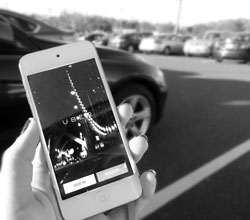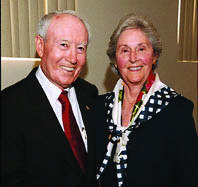Uber, an app-based car service, may offer an alternative to traditional taxi cab business for University students.
Dr. Susan Forquer Gupta, MBA Director and Associate Professor of Marketing and International Business, said, “It is not that much different than eBay providing a system to sell/buy items, Etsy, or Craig’s List. Uber collects a fee for use of the service to pay for the system and marketing as well as create a profit. Uber exists because it is taking advantage of the dissatisfaction customers have with other available option to their transportation needs.”
Founded in 2009 as “UberCab” by Garrett Camp and Travis Kalanick, Uber has a mission statement of “evolving the way the world moves.” According to Uber.com, the simplicity of the service appeals to our fast -paced society, as do the easy sign up, the comfortable rides, and timely reliability.
Once downloaded, Uber allows customers to create an account. This requires users to surrender some of their personal information including their credit card number, phone number, and address.
When needed, Uber users can then insert their desired address of pick-up, map out a route, and view the availability and pricing of Uber cars in the area.
William McElrath, Chief of the Monmouth University Police Department (MUPD), said, “I would be concerned about giving any of my personal information to anyone until I know how it was protected.”
Uber drivers are everyday people using their own cars to drive customers around. Once confirmed, users of the app will see a name and picture of their driver, along with the car they will be picked up in.
Uber utilizes easy-to-use GPS technology for the customer and driver. If a customer cancels the ride via the app, the driver is alerted and rerouted to the nearest customer in need of a ride, according to Uber.com.
As of Aug. 14, 2012, Uber was under scrutiny from the Division of Standards of the Commonwealth of Massachusetts, claiming “that until the National Institute of Standards and Technology has guidelines in place for GPS location technology, [they] cannot provide the application to the public.”
However, Kalanick swiftly retorted, citing their “extensive legal research prior to entering the city of Boston… that the technology and service [they] offer does not violate existing law and regulation.”
Additionally, Uber has recently received heavy scrutiny for their surge pricing techniques. During certain heavy traffic times, Uber will greatly increase prices, often ten times the normal cost of a cab ride. Following numerous customer complaints, Uber received an “F” rating from the Better Business Bureu (BBB) in regards to performance transparency.
Claire Zilenziger, a junior psychology major, said she has never experienced these price surging techniques, though. “I haven’t paid for a single Uber ride yet because of their promotional ten-dollar coupon on signing up, we just keep rotating in my friend group who signs up,” she said.
While Uber may infringe on potential cabbie customers, it appeals to the cabbies themselves. Even some of the drivers of the cab companies are considering switching over because of the easy to use interface of the app and no interference from the dispatcher on the radio.
Tom, a driver for Shore Taxi who asked to withhold his last name for job security purposes, said, “I’m considering switching over to work for Uber because they pay their drivers better and there is no hassle to the drivers when doing their job.”
“Uber seems to treat their employees with respect and allow the drivers to do their job without interfering,” said Tom.
Local cab companies still have a strong clientele despite Uber’s presence.
Natalie Candela, a sophomore communication journalism/public relations major who prefers local cabs, said, “They arrive on time and they seem to be fair priced.” At the end of the day, Candela believes it’s all about the cheapest safest ride for college kids.
Zilenziger disagrees with Candela, and feels that the simplicity of the phone app and process is much more appealing than waiting around for a local cab.
McElrath said, “Another concern with Uber I have is that I would be interested in knowing what kind of background checks there are for Uber drivers, who inspects the vehicles involved to ensure they are safe, and what kind of insurance coverage are they carrying.”
Bradford Crouch, an Uber driver in the Long Branch area, described how the actual inspection process that cabs must go through is completely different for Uber cars and the licensed Shore Taxi cabs. “As long as my vehicle has passed inspection and I provide the paperwork for that to Uber, then I’m good to go,” Crouch said.
Considering Shore Taxi is licensed with Monmouth County, the company registers all of their cars and drivers through a safety screening process. Uber is a private company that is independent of those responsibilities.
Despite the controversy of Uber, Zilenziger believes it is hard to ignore the growing popularity of the app, especially among the large targeted audience of college students.
PHOTO COURTESY of Kierra Lanni



